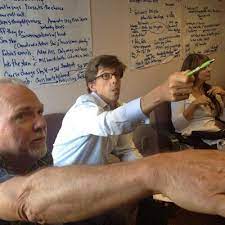
Bill Duryea is deputy editor for features at Politico magazine where he has worked since 2015. Over a 24-year career at the St. Petersburg (now Tampa Bay) Times he worked as a police reporter, general assignment reporter for the Floridian newsfeatures section, national editor and editor of the enterprise team. Reporters he has worked with have won awards from the American Society of News Editors, National Headliner, Florida Society of News Editors, National Press Foundation and Society of Professional Journalists.
What’s the most important lesson you’ve learned as an editor?
If I’m writing, I’ve failed. That doesn’t mean I’ve never rewritten a sentence or even paragraphs. Deadlines and the limits of a writer’s raw abilities at a given moment sometimes demand I step in. But the most satisfying edits for me (and I hope for the writer, too) are the product of conversations during which our mutual goals for the piece become so aligned that my nagging questions, my suggested rephrasings and even my cuts make enough sense to the writer that they can execute the changes with complete faith that the piece is still theirs. When I find myself typing too much in a story, I always think: The time I’m spending now “fixing” something would have been much better spent days ago when a conversation would have addressed the issue before it became a problem.
What has been the biggest surprise of your editing life?
That editing stories about politics would reveal how much I still have to learn about journalism and what readers really crave. I never expected to end up at a website like Politico whose plugged-in readers reputedly had no time for long narratives. That wasn’t exactly true. Turns out they have plenty of time for a detail-rich profile (as any number of Michael Kruse pieces have proved). Of course, they want scoops and ammunition for their political battles but even the most harried Capitol Hill staffer cannot resist the time-slowing satisfactions of a well-constructed historical narrative. If you can make them relevant to the current moment, stories like that provide readers with a necessary respite from the barrage of brevity that assaults their inboxes every day. I wasn’t sure this was true when I arrived eight years ago, but I am now.
If you had to use a metaphor to describe yourself as an editor, what would it be?
How about pool player? Most any shot on a pool table is makable if you can deliver the cue ball to the object ball at just the right angle and with just the right amount of force. When I talk to writers, especially ones who are new to me, or put notes in their copy, I want to impart a clear, respectful message that lands in such a way that they leave the interaction moving confidently in the right direction. Sometimes that note is delicate and the angle oblique (“Have you thought trying it like this …?” or “When I read this it made me think of X. Did you mean it that way?’’). Sometimes it’s more direct and forceful (“We need to change this because …”) But just as in pool, it’s the next shot and the shot after that that matters most, so I’m careful not to say something that hinders the writer’s ability to move forward.
What’s the best piece of editing advice anyone ever gave you?
The best piece of editing advice I ever got was actually a piece of writing advice. It came. not surprisingly, from a great writer who also happens to be the best editor I ever had. Mike Wilson helped me find my voice as a writer at the St. Pete (now Tampa Bay) Times by pushing me to find the larger meaning of my reporting. And then say it. Mike would take my workmanlike drafts and gently point out the places where I could “have a little fun.” “Maybe like this?” he’d say, as I sat just off his shoulder, watching him effortlessly riff a sentence or just a clause that enlivened my piece with humor or pathos. Mike was showing me the difference between relaying facts and telling a story. As an editor, I look for opportunities to do that Wilsonian thing for writers — to help them transcend their reporting and “have a little fun.”